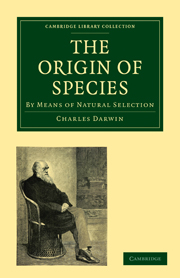 The Origin of Species
The Origin of Species Book contents
- Frontmatter
- Contents
- INSTRUCTION TO BINDER
- ADDITIONS AND CORRECTIONS, TO THE SIXTH EDITION
- HISTORICAL SKETCH
- INTRODUCTION
- CHAPTER I VARIATION UNDER DOMESTICATION
- CHAPTER II VARIATION UNDER NATURE
- CHAPTER III STRUGGLE FOR EXISTENCE
- CHAPTER IV NATURAL SELECTION; OR THE SURVIVAL OF THE FITTEST
- CHAPTER V LAWS OF VARIATION
- CHAPTER VI DIFFICULTIES OF THE THEORY
- CHAPTER VII MISCELLANEOUS OBJECTIONS TO THE THEORY OF NATURAL SELECTION
- CHAPTER VIII INSTINCT
- CHAPTER IX HYBRIDISM
- CHAPTER X ON THE IMPERFECTION OF THE GEOLOGICAL RECORD
- CHAPTER XI ON THE GEOLOGICAL SUCCESSION OF ORGANIC BEINGS
- CHAPTER XII GEOGRAPHICAL DISTRIBUTION
- CHAPTER XIII GEOGRAPHICAL DISTRIBUTION—continued
- CHAPTER XIV MUTUAL AFFINITIES OF ORGANIC BEINGS: MORPHOLOGY: EMBRYOLOGY: RUDIMENTARY ORGANS
- CHAPTER XV RECAPITULATION AND CONCLUSION
- GLOSSARY OF SCIENTIFIC TERMS
- INDEX
- Plate section
CHAPTER XV - RECAPITULATION AND CONCLUSION
Published online by Cambridge University Press: 29 August 2010
- Frontmatter
- Contents
- INSTRUCTION TO BINDER
- ADDITIONS AND CORRECTIONS, TO THE SIXTH EDITION
- HISTORICAL SKETCH
- INTRODUCTION
- CHAPTER I VARIATION UNDER DOMESTICATION
- CHAPTER II VARIATION UNDER NATURE
- CHAPTER III STRUGGLE FOR EXISTENCE
- CHAPTER IV NATURAL SELECTION; OR THE SURVIVAL OF THE FITTEST
- CHAPTER V LAWS OF VARIATION
- CHAPTER VI DIFFICULTIES OF THE THEORY
- CHAPTER VII MISCELLANEOUS OBJECTIONS TO THE THEORY OF NATURAL SELECTION
- CHAPTER VIII INSTINCT
- CHAPTER IX HYBRIDISM
- CHAPTER X ON THE IMPERFECTION OF THE GEOLOGICAL RECORD
- CHAPTER XI ON THE GEOLOGICAL SUCCESSION OF ORGANIC BEINGS
- CHAPTER XII GEOGRAPHICAL DISTRIBUTION
- CHAPTER XIII GEOGRAPHICAL DISTRIBUTION—continued
- CHAPTER XIV MUTUAL AFFINITIES OF ORGANIC BEINGS: MORPHOLOGY: EMBRYOLOGY: RUDIMENTARY ORGANS
- CHAPTER XV RECAPITULATION AND CONCLUSION
- GLOSSARY OF SCIENTIFIC TERMS
- INDEX
- Plate section
Summary
As this whole volume is one long argument, it may be convenient to the reader to have the leading facts and inferences briefly recapitulated.
That many and serious objections may be advanced against the theory of descent with modification through variation and natural selection, I do not deny. I have endeavoured to give to them their full force. Nothing at first can appear more difficult to believe than that the more complex organs and instincts have been perfected, not by means superior to, though analogous with, human reason, but by the accumulation of innumerable slight variations, each good for the individual possessor. Nevertheless, this difficulty, though appearing to our imagination insuperably great, cannot be considered real if we admit the following propositions, namely, that all parts of the organisation and instincts offer, at least, individual differences—that there is a struggle for existence leading to the preservation of profitable deviations of structure or instinct—and, lastly, that gradations in the state of perfection of each organ may have existed, each good of its kind. The truth of these propositions cannot, I think, be disputed.
It is, no doubt, extremely difficult even to conjecture by what gradations many structures have been perfected, more especially amongst broken and failing groups of organic beings, which have suffered much extinction; but we see so many strange gradations in nature, that we ought to be extremely cautious in saying that any organ or instinct, or any whole structure, could not have arrived at its present state by many graduated steps.
- Type
- Chapter
- Information
- The Origin of SpeciesBy Means of Natural Selection, or the Preservation of Favoured Races in the Struggle for Life, pp. 404 - 429Publisher: Cambridge University PressPrint publication year: 2009First published in: 1859


